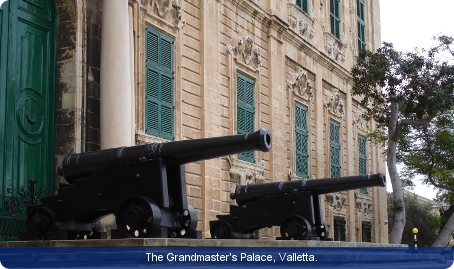Government
- Overview
- History

Malta is a democratic republic. The government is the seat of executive power, and is headed by the prime minister. Legislative power resides in both the executive and the legislature.
The president is elected for a five-year term by the unicameral House of Representatives. The president appoints as prime minister the leader of the party with the majority of seats in the House. The president also appoints, on the advice of the prime minister, the individual ministers who are selected from the members of the House.
Although the president does have executive authority, the position is largely ceremonial since he or she must act on the advice of the prime minister and cabinet.
The House of Representatives has 65 members, with bonus seats being given to the party which gains an absolute majority of the votes but not a parliamentary majority. Elections take place at least every five years under a system of single transferable vote.
For the purposes of local government the island of Malta has one city council (Valletta) and 54 district councils, and the island of Gozo has 14 district councils.
Under the constitution, Roman Catholic Christianity is the state religion and must be taught in state schools.
The judiciary is independent. The Constitutional Court has jurisdiction in matters relating to elections and membership of the House of Representatives, and hears appeals involving human rights, the constitution and the integrity of laws. The Court of Appeal receives appeals regarding civil cases from the civil or magistrates’ courts, or from the several administrative tribunals. The Court of Criminal Appeal deals with appeals arising from criminal cases in the criminal or magistrates’ courts. Criminal courts generally sit with a judge and jury.
Malta’s legal system is a combination of English common law and civil law (grounded in the Roman and Napoleonic civil codes).

Malta (Melita, or ‘Honey Island’, in Latin) was colonised from Carthage during the sixth century BC. According to tradition, the famous Carthaginian general Hannibal was born in Malta. Through its lengthy history, Malta has been subjected to a number of influences, as shown by its language: the Maltese language descends from Punic, with an Arabic element.
Britain officially acquired Malta in 1814; Malta became independent in 1964 and became a republic within the Commonwealth in 1974.
Since independence, the party system has been dominated by the conservative Nationalist Party (PN) and the socialist Malta Labour Party (MLP). Political conflict was exacerbated by anomalies in the electoral system, which allowed the MLP to retain power after the 1981 parliamentary elections even though the PN had more votes.
The issue of EU membership created a great deal of controversy between the two main parties. Although the referendum in 2003 gave the PN government a mandate to proceed with ratifying the treaty for accession to the EU in 2004, the opposition continued to insist that it would take Malta out of the EU if it won the 2004 general election. The government brought the election forward to April 2003 and managed to win an overall majority of seats as well as 51.8% of the popular vote, which decisively closed the debate. Following the election the MLP decided to end its opposition to EU membership, thus ending a long period when political activity was focused on one issue.
The PN was returned to power in the 2008 parliamentary elections, winning 35 seats (the MLP won 34).
In April 2009, Dr George Abela of the MLP was unanimously elected president by parliament. The former president, Fenech-Adami, had belonged to the PN.



